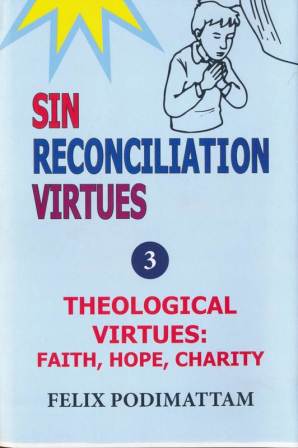Description
Dr. Felix Podimattam is one of the best-known moral theologians in India & outside. Besides his full time job as a professor, he finds time to write books at an amazing rate. He has authored 136 books.Besides his Masters degree in Political Science from Mysore, he holds a Licentiate in Theology from the Pontifical Gregorian University, Rome, & subsequently a Doctorate in Moral Theology from the Alphonsian Academy, Rome. His post-doctoral studies were pursued in Washington, DC, USA. At present he is professor of Moral Theology at St. Francis Theological College, Kottayam, Kerala, India.
CONTENTS
INTRODUCTION
CHAPTER ONE
THEOLOGICAL VIRTUES TN GENERAL
1. Preliminary Considerations
2. The Theological Virtues as the Foundation of
Supernatural Moral Life
3. The Theological Virtues as Foundation and
Epitome of the Mysterious Dialog between God and Man
4. The Theological Virtues as Inner
Dynamism of the Imitation
CHAPTER TWO
VIRTUE OF FAITH
1. Nature of Faith
1.1. Relevance of Christian Faith
1.2. Notion of Faith
1.2.1. Faith as Personal Encounter with God
1.2.2. Faith as Assent to Revealed Truths
1.2.3. Faith according to St. Paul
1.2.4. Faith according to the Charismatic Renewal
1.3. Faith and Other Realities
1.3.1. Faith and Community
1.3.2. Faith and Religion
1.3.3. Faith and Theology
1.3.4. Faith and Reason
1.3.5. Faith and Conscience
1.3.6. Faith and Love
1.3.7. Faith and the Sacrament of Faith
1.3.8. Faith Perfected through the Gifts of the Holy Spirit
1.4. Pastoral Aspects of Faith
1.4.1. Faith is to be Lived
1.4.2. Portrait of a Man of Faith
1.4.3. The Knowledge of Faith Necessary for Salvation
2. Duties of Faith
2.1. Duly of Knowing the Truths of Faith
2.2. Duty to Elicit Acts of Faith
2.3. Duty to Profess One’s Faith
2.4. Duty of Spreading the Faith
2.5. Duty to Safeguard the Faith
2.6. Dutv 10 Submit to the Magisterium
3. Sins against Faith
3.1. Unbelief
3.2. The Sin of Heresy
3.3. Doubt against Faith
3.4. Collective Apostasy and Doubt, against Faith
3.5. Atheism and Secularism
CHAPTER THREE
VIRTUE OF HOPE
1. Importance of Hope
2. Nature of Hope
2.1. Biblical Understanding of Hope
2.1.1. The Old Testament
2.1.2. The New Testament
2.2. Theological Understanding of Hope
2.2.1. Natural Hope
2.2.2. Supernatural Hope
2.3. Definition of Hope
3. The Necessity of Hope
4. The Sanctifying Power of Hope
5. Fruits of Hope
5.1. Endurance in Suffering
5.2. Openness for the Future
5.3. Summons to Transform the World
6. Growth in Hope.
7. Hope is Perfected through the Gifts of the Holy Spirit
8. Sins against Hope.
8.1. Presumption.
8.2. Despair.
8.3. Resignation.
9. Pastoral Reflections on Hope
10. Answer to Difficulties
CHAPTER FOUR
VIRTUE OF CHRISTIAN LOVE IN GENERAL
1. Inadequate Understanding of “Charity”
2. Notion of Christian Love
3. Characteristics of Christian Love
4. Christian Love as the Highest Moral Value
5. The Paradox of Love being Commanded
6. Christian Love as the Bond and Form of All Virtues
7. Growth of Christian Love
8. The Perfection of Christian Love
CH APTER FIVE
VIRTUE OF CHRISTIAN LOVE FOR GOD
1. Nature of Christian Love in Holy Scripture
1.1. The Old Testament.
1.2. The New Testament
2. Concept of Christian Love in Theology
3. Realization of Christian Love in Prayer and Deed
4. Sins against Christian Love for God.
4.1. Indifference.
4.2. Hatred of God
5. A More Detailed Consideration of
Some Issues related to Love for God
5.1. Why is God to be Loved Sovereignly?
5.1.1. God is Worth Our Love
5.1.2. We were Created to Love Him.
5.1.3. We are Commanded to Love Him
5.3. What is the Meaning of Loving God
with all Your Mind?
5.4. What is the Meaning of Loving God
with all Your Strength?
CHAPTER SIX
VIRTUE OF CHRISTIAN LOVE F( )R NEIGHBOR
1. Scriptural Data on Love for Neighbor
2. Who is Our Neighbor
3. The Order of Love for Neighbor
4. Our Enemies as “Neighbors”
4.1. Scriptural Teaching aboul Love for Enemies
4.2. How Is It Possible to Love Our Enemies.
4.3. Why Should We Love Our Enemies
4.4. What Love for Enemies Does Not N lean
4.4.1. Love for Enemies Does Not Mean
Giving Way to Injustice
4.4.2. Love for Enemies Does Not Implv
that We Feel at Ease with Them
4.4.3. Love for Enemies Does Not Mean Friendship
4.5. What Love for Enemies Does Mean
4.6. Pastoral Reflections 011 Love for Enemies
5. Our Friends as “Neighbors”
7. Characteristics of Love for Neighbor
8. The Standard of Love for Neighbor
9. Love for Neighbor and Bodily Needs
9.1. The Obligation of Charity.
9.1.1. Testimony of Scripture
9.1.2. Testimony of the Magisterium.
9.1.3. Testimony of Tradition
9.1.4. Testimony from the History of the Church.
9.1.5. Man is not Simply a Spirit
9.1.6. Charity as “Sacrament of the Love of God”.
9.2. Moral Aspects of Charity
9.3. Pastoral Aspects of Charity
9.3.1. How Much Should We Care for Others
9.3.2. Charity versus “Do-Goodism”
9.3.3. Christ, the Foundation of All Social Service Work
9.4. Private and Public Charitable Works
10. Love for Neighbor and Spiritual Needs
10.1. Obligation of Active Concern
for the Salvation of Others
10.2. Forms of Active Zeal for Souls
10.2.1. The Apostolate of Prayer
10.2.2. The Apostolate of Expiation
10.2.3. The Apostolate of Good Exaple
10.2.3.1. Biblical Basis for the Apostolate of Good Example
10.2.3.2. Psychological Basis for the Apostolate of
Good Example
10.2.3.3. The Obligation to Give Good Example
10.2.3.4. Necessary Characteristics of Good Example
10.2.4. The Apostolate of Fraternal Correction
10.2.4.1. Meaning and Obligation
10.2.4.2. The Right Procedure in Correcting Others
10.2.4.3. Reporting Faults
10.2.5. The Apostolate of Tolerance
10.2.6. The World Mission of the Laity
11. Sins against Love for Neighbor
11.1. Seduction
11.2. Scandal
11.2.1. The General Concept
11.2.2. The Biblical Use of the Term
11.2.3. Our Dispositions and the Various Species of Scandal
11.2.3.1. Scandal of Misconduct and Spiritual Mediocrity
11.2.3.2. The Scandal of the Weak
11.2.3.2.1. Nature of the Scandal of the Weak
11.2.3.2.2. What the Scandal of the Weak Doesn’t Demand?
11.2.3.2.3. What Does the Scandal of the Weak Permit?
11.2.3.2.4. What Are Some Pastoral Applications?
11.2.3.2.5. What is the Scandal of the Strong?
11.2.3.3. Scandal Due to Malice
11.2.4. Taking Scandal
11.2.4.1. Sinful Scandal-Taking
11.2.4.2. Hazardous but Not Sinful Scandal-Taking.
11.2.4.3. Salutary Scandal-Taking.
11.2.5. Common Areas of Scandal
11.2.5.1. Fashions
11.2.5.2. Degenerate Art
11.2.5.3. Smut and Filth in Literature
11.2.6. Reparation for Scandal
11.3. Complicity in the Stns of Others
11.3.1. Principles Governing Cooperation
11.3.2. Examples of Licit and Illicit Cooperation
11.3.2.1. Cooperation of Servants and Officials
11.3.2.2. Cooperation of Physicians, Nurses,
-7 AS
and Hospital Personnel
11.3.2.3. Various Other Forms of Cooperation:
Taverns, Business, Service
11.3.2.4. Cooperation in Evil by Judges and Lawyers
11.3.2.5. Cooperation in Scandalous Writing
11.3.2.6. Cooperation in Politics
CONCLUSION
BIBLIOGRAPHY
Endnotes




Reviews
There are no reviews yet.